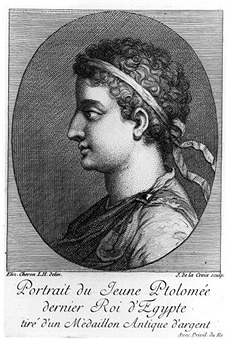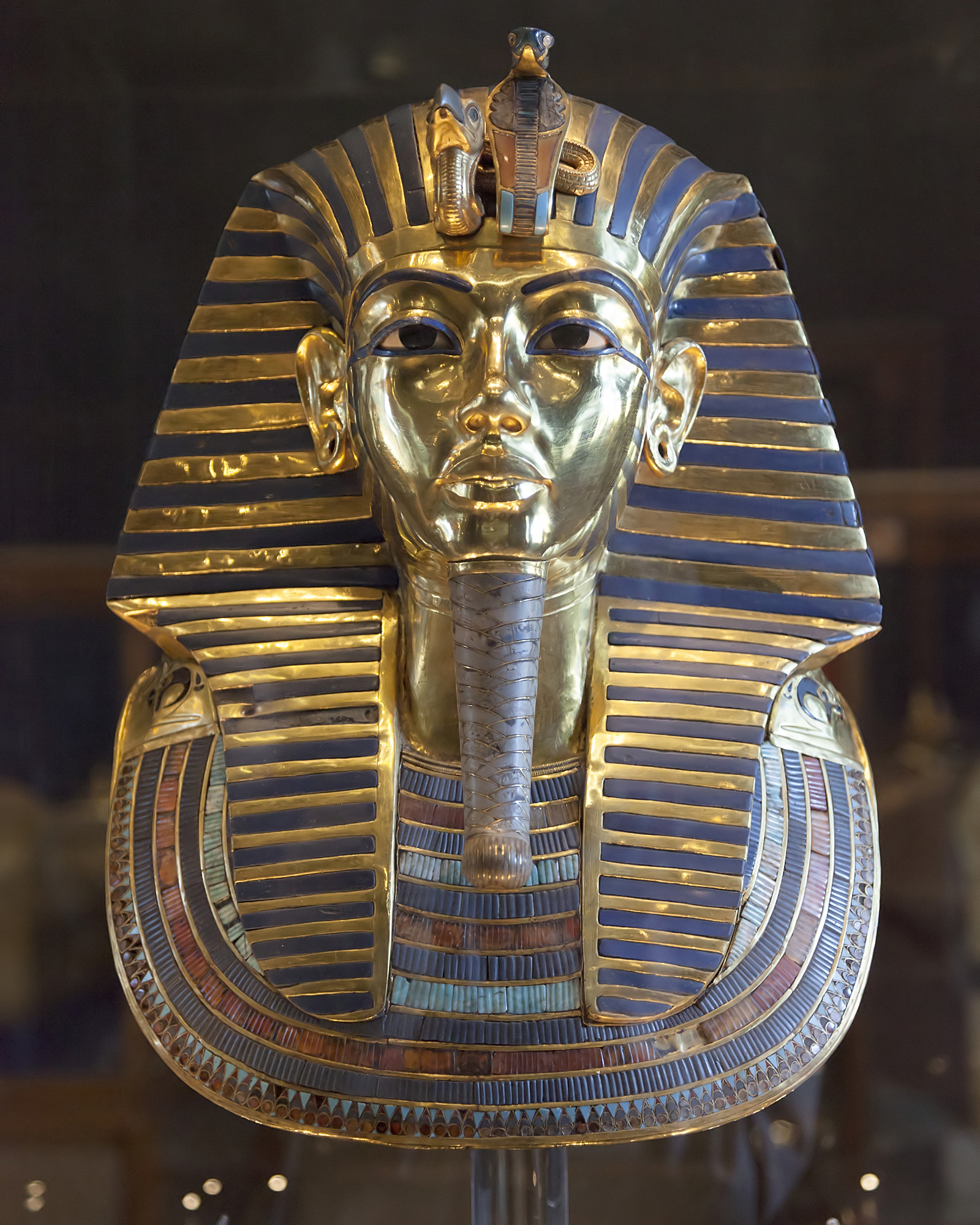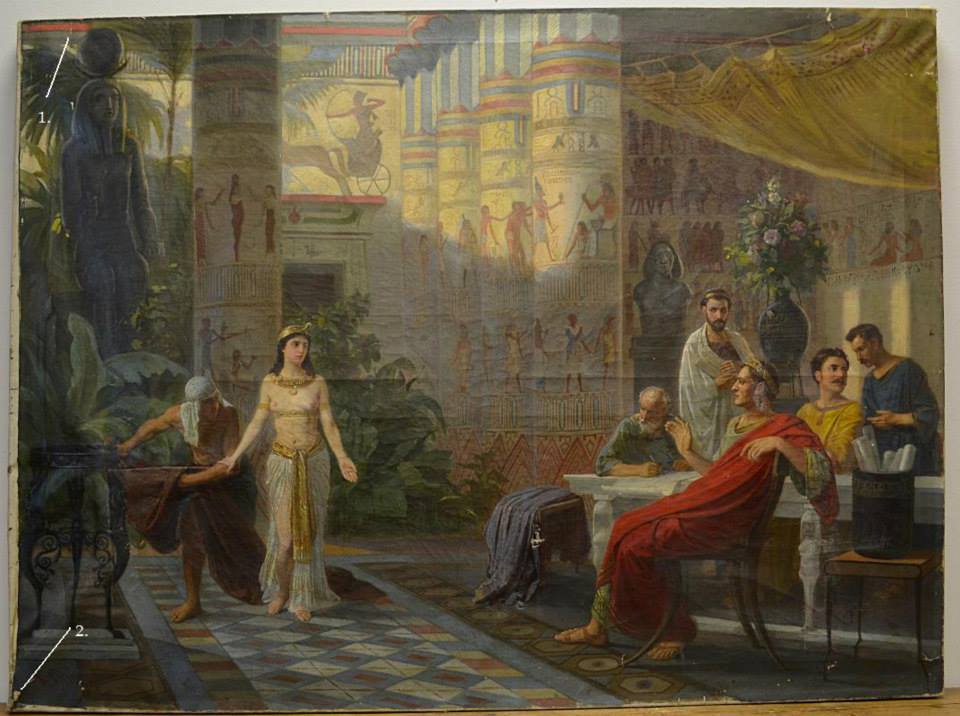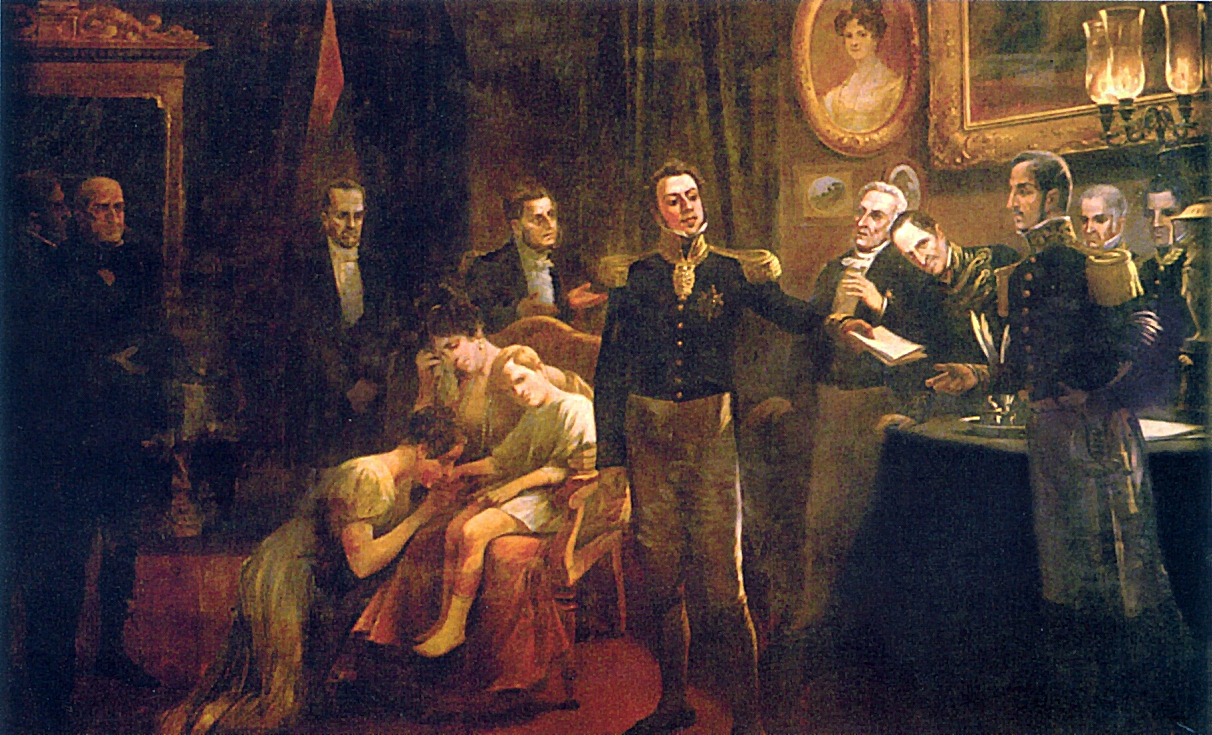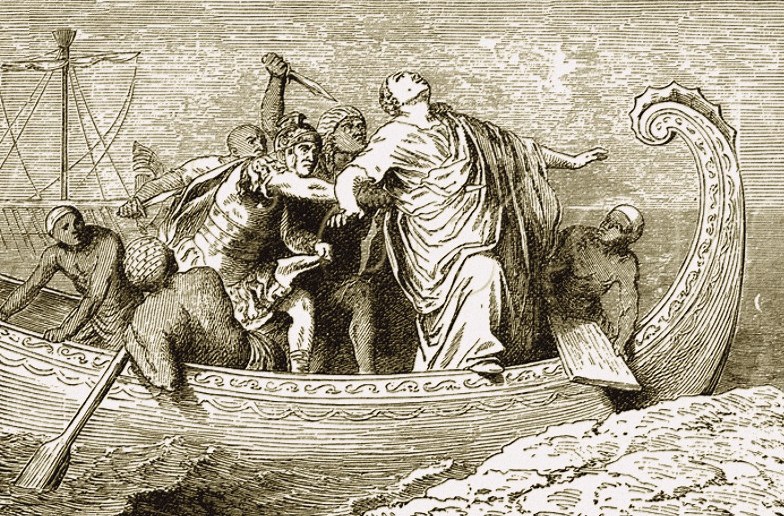|
Ptolemy XIII
Ptolemy XIII Theos Philopator (, ''Ptolemaĩos''; c. 62 BC – 13 January 47 BC) was Pharaoh of Egypt from 51 to 47 BC, and one of the last members of the Ptolemaic dynasty (305–30 BC). He was the son of Ptolemy XII and the brother of and co-ruler with Cleopatra VII. Cleopatra's exit from Egypt caused a civil war to break out between the pharaohs. Ptolemy later ruled jointly with his other sister, Arsinoe IV. Biography Co-ruler of Egypt Son of the Egyptian Pharaoh Ptolemy XII (r. 80–58 BC and 55–51 BC), Ptolemy XIII succeeded his father as pharaoh of the Ptolemaic Kingdom in the spring of 51 BC at the age of 11. His father had stipulated that Ptolemy XIII would be married to his older sister Cleopatra (r. 51–30 BC), with the couple ruling as co-rulers. In October 50 BC, Ptolemy XIII was promoted to senior ruler along with her, although the eunuch Pothinus acted as regent for him. In the spring of 48 BC, Ptolemy XIII and Pothinus attempted to depose Cleopatra ... [...More Info...] [...Related Items...] OR: [Wikipedia] [Google] [Baidu] |
Bust (sculpture)
A bust is a Sculpture, sculpted or cast representation of the upper part of the human figure, human body, depicting a person, person's Human head, head and neck, and a variable portion of the chest and shoulders. The piece is normally supported by a plinth. The bust is generally a portrait intended to record the appearance of an individual, but may sometimes represent a type. They may be of any List of art media, medium used for sculpture, such as marble, bronze, terracotta, plaster, wax or wood. As a format that allows the most distinctive characteristics of an individual to be depicted with much less work, and therefore expense, and occupying far less space than a full-length statue, the bust has been since ancient times a popular style of life-size portrait sculpture. A sculpture that only includes the head, perhaps with the neck, is more strictly called a "head", but this distinction is not always observed. Display often involves an integral or separate display stand. The A ... [...More Info...] [...Related Items...] OR: [Wikipedia] [Google] [Baidu] |
Pharaoh
Pharaoh (, ; Egyptian language, Egyptian: ''wikt:pr ꜥꜣ, pr ꜥꜣ''; Meroitic language, Meroitic: 𐦲𐦤𐦧, ; Biblical Hebrew: ''Parʿō'') was the title of the monarch of ancient Egypt from the First Dynasty of Egypt, First Dynasty () until the Roman Egypt, annexation of Egypt by the Roman Republic in 30 BCE. However, the equivalent Egyptian language, Egyptian word for "king" was the term used most frequently by the ancient Egyptians for their monarchs, regardless of gender, through the middle of the Eighteenth Dynasty during the New Kingdom of Egypt, New Kingdom. The earliest confirmed instances of "pharaoh" used contemporaneously for a ruler were a letter to Akhenaten (reigned –1336 BCE) or an inscription possibly referring to Thutmose III (–1425 BCE). In the early dynasties, ancient Egyptian kings had as many as ancient Egyptian royal titulary, three titles: the Horus name, Horus, the prenomen (Ancient Egypt), Sedge and Bee (wikt:nswt-bjtj, ''nswt-bjtj''), and ... [...More Info...] [...Related Items...] OR: [Wikipedia] [Google] [Baidu] |
Library Of Alexandria
The Great Library of Alexandria in Alexandria, Egypt, was one of the largest and most significant libraries of the ancient world. The library was part of a larger research institution called the Mouseion, which was dedicated to the Muses, the nine goddesses of the arts.Murray, S. A., (2009). The library: An illustrated history. New York: Skyhorse Publishing, p. 17 The idea of a universal library in Alexandria may have been proposed by Demetrius of Phalerum, an exiled Athenian statesman living in Alexandria, to Ptolemy I Soter, who may have established plans for the Library, but the Library itself was probably not built until the reign of his son Ptolemy II Philadelphus. The Library quickly acquired many papyrus scrolls, owing largely to the Ptolemaic kings' aggressive and well-funded policies for procuring texts. It is unknown precisely how many scrolls were housed at any given time, but estimates range from 40,000 to 400,000 at its height. Alexandria came to be regarded ... [...More Info...] [...Related Items...] OR: [Wikipedia] [Google] [Baidu] |
Siege Of Alexandria (47 BC)
The siege of Alexandria was a series of skirmishes and battles occurring between the forces of Julius Caesar, Cleopatra VII, Arsinoe IV, and Ptolemy XIII, between 48 and 47 BC. During this time Caesar was engaged in a civil war against remaining Republican forces. The siege was lifted by relief forces arriving from Syria. After a battle contesting those forces' crossing of the Nile delta, Ptolemy XIII and Arsinoe's forces were defeated. Events Prelude After the Battle of Pharsalus, Pompey abandoned his defeated army and fled with his advisors overseas to Mytilene and then to Cilicia where he held a council of war. Pompey's council of war decided to flee to Egypt, which had in the previous year supplied him with military aid. His arrival in Egypt coincided with political tension between King Ptolemy XIII Theos Philopator and his sister Queen Cleopatra. After the death of their father, Ptolemy XII Auletes, the pair were decided to co-rule Egypt as was stated in Ptolemy ... [...More Info...] [...Related Items...] OR: [Wikipedia] [Google] [Baidu] |
Alexandria
Alexandria ( ; ) is the List of cities and towns in Egypt#Largest cities, second largest city in Egypt and the List of coastal settlements of the Mediterranean Sea, largest city on the Mediterranean coast. It lies at the western edge of the Nile Delta, Nile River delta. Founded in 331 BC by Alexander the Great, Alexandria grew rapidly and became a major centre of Hellenic civilisation, eventually replacing Memphis, Egypt, Memphis, in present-day Greater Cairo, as Egypt's capital. Called the "Bride of the Mediterranean" and "Pearl of the Mediterranean Coast" internationally, Alexandria is a popular tourist destination and an important industrial centre due to its natural gas and petroleum, oil pipeline transport, pipelines from Suez. The city extends about along the northern coast of Egypt and is the largest city on the Mediterranean, the List of cities and towns in Egypt#Largest cities, second-largest in Egypt (after Cairo), the List of largest cities in the Arab world, fourth- ... [...More Info...] [...Related Items...] OR: [Wikipedia] [Google] [Baidu] |
Abdication
Abdication is the act of formally relinquishing monarchical authority. Abdications have played various roles in the Order of succession, succession procedures of monarchies. While some cultures have viewed abdication as an extreme abandonment of duty, in other societies (such as pre-Meiji Restoration Japan), abdication was a regular event and helped maintain stability during political succession. Historically, abdications have occurred both by force (where the regnant was ''Dethronement, dethroned'', thus forced to abdicate on pain of death or other severe consequences) and voluntarily. Some rulers are deemed to have abdicated wiktionary:in absentia, ''in absentia'', vacating the physical throne and thus their position of power, although these judgements were generally pronounced by successors with vested interests in seeing the throne abdicated, and often without or despite the direct input of the abdicating monarch. Recently, due to the largely ceremonial nature of the regnan ... [...More Info...] [...Related Items...] OR: [Wikipedia] [Google] [Baidu] |
Lucius Septimius
Lucius Septimius was a Roman soldier and mercenary who is principally remembered as one of the assassins of the triumvir Pompey the Great. At the time of the assassination in 48 BC, Septimius was serving the Ptolemies of Egypt as a mercenary. He was dispatched with orders to murder Pompey by Ptolemy XIII's advisors who wanted to win the favour of Julius Caesar for their king. Life Septimius had served under Pompey in his eastern campaign in the 60s BC, and he was in the army with which Aulus Gabinius restored Cleopatra's father Ptolemy XII Auletes to the throne in 55 BC. He had stayed in Egypt as part of a mercenary garrison, known as the Gabiniani, to support the king.Beryl Rawson, ''The Politics of Friendship: Pompey and Cicero'' Volume: 6. Sydney University Press. 1978, p.177 In ''Commentarii de Bello Civili'', Caesar refers to him as a "military tribune". Septimius was a leading figure among the Gabiniani. When Pompey fled to Egypt in 48 BC following his defeat by Julius ... [...More Info...] [...Related Items...] OR: [Wikipedia] [Google] [Baidu] |
Achillas
Achillas (; died 47 BC) was one of the guardians of the Egyptian king Ptolemy XIII Theos Philopator, and commander of the king's troops, when Pompey fled to Egypt in September 48 BC. He was called by Julius Caesar a man of extraordinary daring, and it was he and Lucius Septimius who killed Pompey at the suggestion of the eunuch Pothinus and Theodotus of Chios. Achillas subsequently joined Pothinus in resisting Caesar, and having had the command of the whole army entrusted to him by Pothinus, he marched against Alexandria with 20,000 infantry and 2,000 cavalry. Caesar, who was at Alexandria, did not have sufficient forces to oppose him, and sent ambassadors to negotiate with him. However, Achillas murdered the ambassadors to remove all hopes of reconciliation. He then marched into Alexandria and some of the city. Meanwhile, Arsinoe, the younger sister of Ptolemy, escaped from Caesar and joined Achillas. However, in 47 BC, dissension broke out between them, so Arsinoe had ... [...More Info...] [...Related Items...] OR: [Wikipedia] [Google] [Baidu] |
Julius Caesar
Gaius Julius Caesar (12 or 13 July 100 BC – 15 March 44 BC) was a Roman general and statesman. A member of the First Triumvirate, Caesar led the Roman armies in the Gallic Wars before defeating his political rival Pompey in Caesar's civil war, a civil war. He subsequently became Roman dictator, dictator from 49 BC until Assassination of Julius Caesar, his assassination in 44 BC. Caesar played a critical role in Crisis of the Roman Republic, the events that led to the demise of the Roman Republic and the rise of the Roman Empire. In 60 BC, Caesar, Marcus Licinius Crassus, Crassus, and Pompey formed the First Triumvirate, an informal political alliance that dominated Roman politics for several years. Their attempts to amass political power were opposed by many in the Roman Senate, Senate, among them Cato the Younger with the private support of Cicero. Caesar rose to become one of the most powerful politicians in the Roman Republic through a string of military victories in the G ... [...More Info...] [...Related Items...] OR: [Wikipedia] [Google] [Baidu] |
Pompey The Great
Gnaeus Pompeius Magnus (; 29 September 106 BC – 28 September 48 BC), known in English as Pompey ( ) or Pompey the Great, was a Roman general and statesman who was prominent in the last decades of the Roman Republic. As a young man, he was a partisan and protégé of the dictator Sulla, after whose death he achieved much military and political success himself. He was an ally and a rival of Julius Caesar, and died in civil war with him. A member of the senatorial nobility, Pompey entered into a military career while still young. He rose to prominence serving Sulla as a commander in the civil war of 83–81 BC. Pompey's success as a general while young enabled him to advance directly to his first consulship without following the traditional ''cursus honorum'' (the required steps to advance in a political career). He was elected as consul on three occasions (70, 55, 52 BC). He celebrated three triumphs, served as a commander in the Sertorian War, the T ... [...More Info...] [...Related Items...] OR: [Wikipedia] [Google] [Baidu] |
Roman Republic
The Roman Republic ( ) was the era of Ancient Rome, classical Roman civilisation beginning with Overthrow of the Roman monarchy, the overthrow of the Roman Kingdom (traditionally dated to 509 BC) and ending in 27 BC with the establishment of the Roman Empire following the War of Actium. During this period, Rome's control expanded from the city's immediate surroundings to hegemony over the entire Mediterranean Sea, Mediterranean world. Roman society at the time was primarily a cultural mix of Latins (Italic tribe), Latin and Etruscan civilization, Etruscan societies, as well as of Sabine, Oscan, and Greek cultural elements, which is especially visible in the Ancient Roman religion and List of Roman deities, its pantheon. Its political organisation developed at around the same time as direct democracy in Ancient Greece, with collective and annual magistracies, overseen by Roman Senate, a senate. There were annual elections, but the republican system was an elective olig ... [...More Info...] [...Related Items...] OR: [Wikipedia] [Google] [Baidu] |
Arsinoe IV Of Egypt
Arsinoë IV (; between 68 and 63 BC – 41 BC) was the youngest daughter of Ptolemy XII Auletes. One of the last members of the Ptolemaic dynasty, she claimed title of Queen of Ptolemaic Egypt and co-rulership with her brother Ptolemy XIII in 48 BC – 47 BC in opposition to her sister or half-sister, Cleopatra VII.. For her role in conducting the siege of Alexandria (47 BC) against Cleopatra, Arsinoë was taken as a prisoner of war to Rome by the Roman triumvir Julius Caesar following the defeat of Ptolemy XIII in the Battle of the Nile. Arsinoë was then exiled to the Temple of Artemis at Ephesus in Roman Anatolia, but she was executed there by orders of triumvir Mark Antony in 41 BC at the behest of his lover Cleopatra VII. History Arsinoë was the third, possibly fourth daughter of Ptolemy XII by an unknown woman (Cleopatra VII's probable mother Cleopatra V had died or been repudiated not long after Cleopatra VII was born, hence it's unclear if she bore her husband's you ... [...More Info...] [...Related Items...] OR: [Wikipedia] [Google] [Baidu] |
